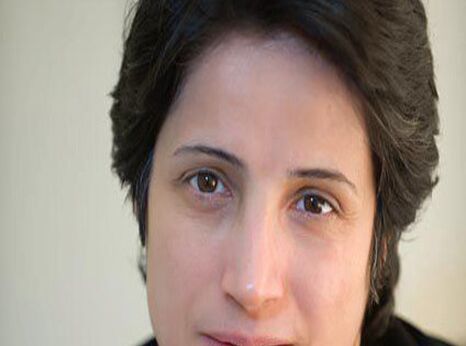Jailed lawyer's health at serious risk

Following Nasrin Sotoudeh’s transfer from Evin prison to hospital, she was subsequently admitted to the hospital’s critical care unit and guarded by security forces, including some who remained in her room at all times and intruded, with impunity, on her privacy while she underwent intimate medical examinations.
Nasrin Sotoudeh was arbitrarily arrested at her home in Tehran on 13 June 2018 and taken to Evin prison, where she has been imprisoned since her arrest. Her trial before Branch 28 of the Revolutionary court in Tehran took place on 30 December 2018 in her absence as she had refused to attend, citing the unjust nature of the proceedings, and for which she had been denied access to her lawyer. In her indictment, the prosecution authorities listed seven charges against her, four of which were based on her opposition to forced veiling: “inciting corruption and prostitution”; “openly committing a sinful act by… appearing in public without a hijab”; “disrupting public order”; and “disturbing public opinion”. The other three charges against her – “forming a group with the purpose of disrupting national security”, “spreading propaganda against the system” and “gathering and colluding to commit crimes against national security” – were also based on peaceful activities that the authorities have deemed as “criminal”.
These activities include belonging to human rights groups such as the Centre for Human Rights Defenders and the Campaign for Step by Step Abolition of the Death Penalty. In a separate case from September 2016, Nasrin Sotoudeh was sentenced to five years in prison for “assisting in hiding spies with the intent to harm national security” by Branch 28 of the Revolutionary Court in Tehran, which tried her in her absence because the court authorities said she was not wearing appropriate Islamic dress and refused her entry. See https://www.amnesty.org/en/documents/mde13/0024/2019/en/ for further information.
Nasrin Sotoudeh issued the following statement when she commenced her hunger strike on 10 August 2020:
Human rights activists,
In the midst of the coronavirus crisis which has engulfed Iran and the world, the conditions of political prisoners have become so difficult and arduous that their continued detention is impossible under these oppressive conditions. The case of political [prisoner] convicts are based on unbelievable charges of espionage, spreading corruption on earth, acting against national security, corruption and prostitution, and forming illegal groups on Telegram channels - charges which must be up to ten years of imprisonment or the death sentence. Many defendants, from the beginning of the formation of the case until the verdict is issued, are denied access to an independent lawyer or [the ability] to freely communicate with their own lawyer. Judges of the Revolutionary Court shamelessly and repeatedly state to political [prisoner] defendants that they issue verdicts solely based on reports from intelligence and security agencies, and the interrogator tells the defendant the verdict upon their arrest. Lawyers who attract the wrath of Revolutionary Court judges are sent to prison. Defendants who have faced unbelievably serious charges are given the maximum sentence, and some cases, even more than the maximum sentence. Then a political prisoner who has been issued with their sentence under such unjust conditions will sit in disbelief hoping for a legal path forward.
Courts of appeal, parole, suspension of punishment and postponement of sentences, as well as a new law which emphasises issuing a minimal sentence has been promised, but in extrajudicial proceedings the exercise of all these legal rights is left to the discretion of the interrogators and so the last doors left for political prisoners are closed.
Many of these prisoners are now eligible for parole, and many would be released through implementation of the new law, but prisoners are still treated as if there was no such law and that they have no right to such legal opportunities. Prisoners’ pleas seeking viable legal paths have been left unanswered.
For all the pleas left unanswered and for the demand of the release of political prisoners, I will go on hunger strike. In the hope of the establishment of justice in my country, Iran.
Nasrin Sotoudeh, women’s ward of Evin prison, 10 August 2020.